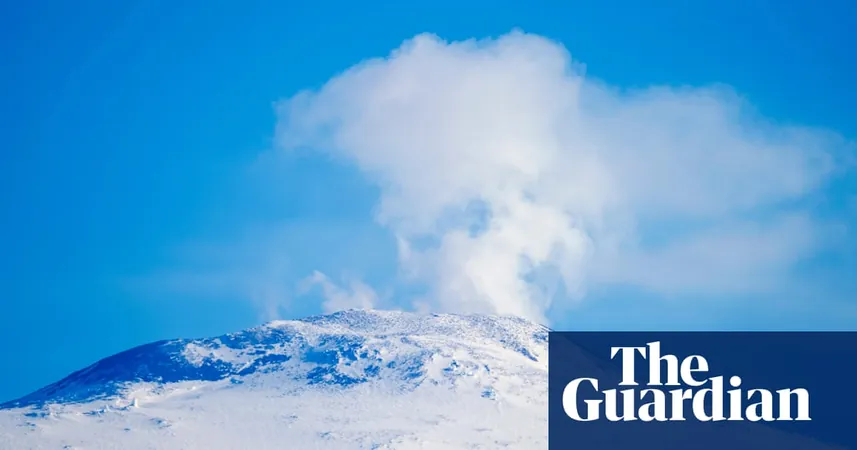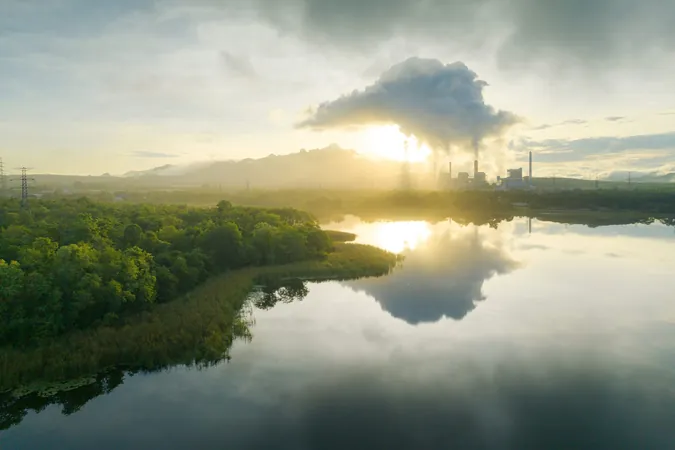
Melting Ice Caps: The Hidden Trigger for Volcanic Explosions?
2025-07-07
Author: Nur
Climate Crisis Sparks Volcanoes?
As glaciers and ice caps continue to melt due to the climate crisis, a shocking new study reveals they could ignite a whirlwind of volcanic eruptions. The loss of ice relieves pressure on subterranean magma chambers, greatly increasing the chances of explosive volcanic activity. While this phenomenon has been noted in Iceland, groundbreaking research from Chile highlights similar dangers on continental landmasses following the last ice age.
Antarctica: A Volcanic Powderkeg?
According to researchers, the most significant threat lies beneath the icy expanse of West Antarctica, home to over 100 dormant volcanoes. As global temperatures rise, these thick ice sheets are set to vanish, potentially unleashing a frenzy of volcanic eruptions.
The Double-Edged Sword of Volcanoes
Volcanic eruptions can initially cool the Earth by releasing particles that reflect sunlight back into the atmosphere. However, sustained activity would release vast amounts of greenhouse gases, including CO2 and methane. This could create a dangerous feedback loop: melting ice leads to eruptions, which in turn exacerbates global warming.
On the Ground Research in the Andes
Pablo Moreno-Yaeger from the University of Wisconsin-Madison spearheaded this compelling research, which was shared at the Goldschmidt geochemistry conference in Prague. The team camped in the Andes, surrounded by both active and dormant volcanoes, to gather crucial data.
Focusing on the Mocho-Choshuenco volcano, they used radioisotope dating to analyze volcanic rock ages from different periods, primarily before, during, and after the last ice age. This investigation underlined how thick ice suppresses eruptions, allowing magma to accumulate significantly.
Explosive Revelations
Their findings showed that as the ice receded around 13,000 years ago, the pressure on magma chambers was released, leading to more frequent and explosive eruptions. Moreno-Yaeger noted, "After deglaciation, volcanoes erupt more often and change their composition, becoming more viscous and explosive."
A Global Concern?
This study is pivotal, suggesting that rising volcanic activity isn't just confined to Iceland but could also be mirrored in Antarctica and other regions, including parts of North America, New Zealand, and Russia—all now deserving of critical scientific scrutiny.
A Historical Parallel
Historically, it has been observed that volcanic activity surged globally by two to six times following the last ice age, marking this Chilean research as one of the first to explore the mechanisms behind such phenomena. Similar findings emerged from analyzes conducted on rocks in eastern California back in 2004.
As climate change continues to reshape our planet, the prospect of unleashed volcanoes adds another layer of complexity to the challenges we face. Timely vigilance and research could help us prepare for the rocky road ahead.



 Brasil (PT)
Brasil (PT)
 Canada (EN)
Canada (EN)
 Chile (ES)
Chile (ES)
 Česko (CS)
Česko (CS)
 대한민국 (KO)
대한민국 (KO)
 España (ES)
España (ES)
 France (FR)
France (FR)
 Hong Kong (EN)
Hong Kong (EN)
 Italia (IT)
Italia (IT)
 日本 (JA)
日本 (JA)
 Magyarország (HU)
Magyarország (HU)
 Norge (NO)
Norge (NO)
 Polska (PL)
Polska (PL)
 Schweiz (DE)
Schweiz (DE)
 Singapore (EN)
Singapore (EN)
 Sverige (SV)
Sverige (SV)
 Suomi (FI)
Suomi (FI)
 Türkiye (TR)
Türkiye (TR)
 الإمارات العربية المتحدة (AR)
الإمارات العربية المتحدة (AR)